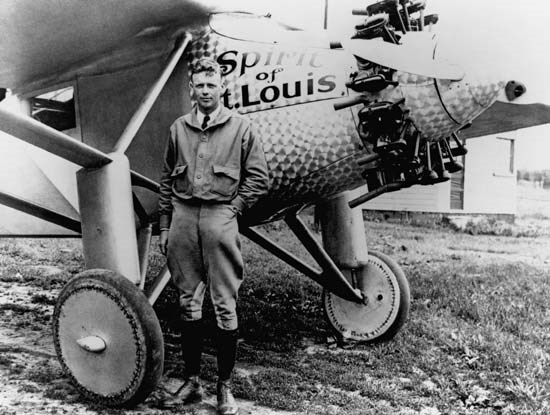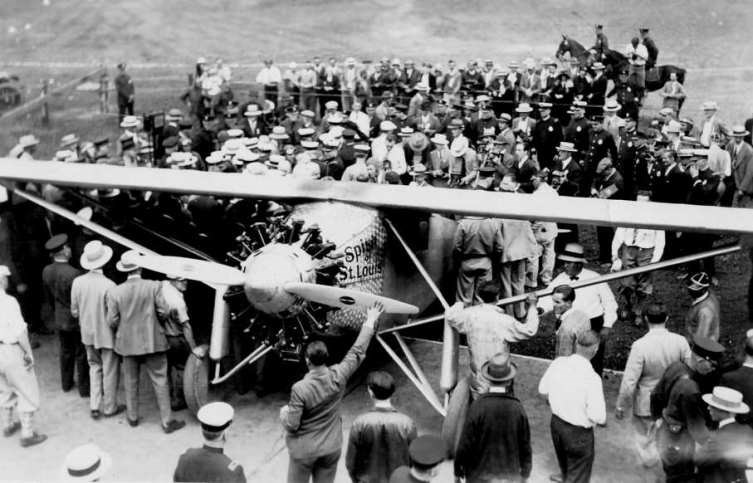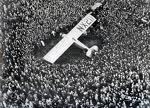“I owned the world that hour as I rode over it. Free of the earth, free of the mountains, free of the clouds, but how inseparably I was bound to them” (“Charles Lindbergh.” BrainyQuote.com). In the early twentieth century, people were constantly searching for a hero. They sought to find someone that could demonstrate their courage as they overcame an obstacle or challenge. Charles Lindbergh snagged their attention with his great bravery and his inspiring flight across the Atlantic Ocean. He is still a hero, and has contributed greatly to our modern aviation technology.
 |
| Charles Lindbergh stands infront of his famous pl (http://campsmoke.files.wordpress.com/2009/08/lindbergh.jpg) |
Charles Lindbergh was born in 1902, on a farm in Detroit, Michigan. He attended the University of Wisconsin with the intent of becoming an engineer. However, his newly developed fascination for airplanes led him to “quit to learn to fly. He became a barnstormer and traveled to fairs and air shows giving demonstrations of flying. Wanting more instruction, he attended Army Flying School in Texas and became a Second Lieutenant in the Army Air Service Reserve. Then he took a job with Robertson Aircraft in St. Louis. In 1926 he flew the inaugural flight of a new airmail route between St. Louis and Chicago” (Landauer). Lindbergh attempted to fly across the Atlantic Ocean, alone, with the knowledge that everyone before him had failed, and some hadn’t even survived.
Charles Lindbergh’s historic solo flight from New York, across the Atlantic Ocean, and eventually to Paris, France, demonstrated immense bravery. “On May 21, 1927, he took five sandwiches and a bottle of water in his plane, the Spirit of St. Louis, and took off from New York's Roosevelt Field” (Fashion, Costume, and Culture). His confidence and fortitude seized the world’s attention. Lindbergh’s bold qualities and historic actions made him a perfect candidate to be seen as a hero; “Lindbergh gained fame not only for his flight, but because he represented qualities of adventurous boldness that were highly valued during the 1920s” (Fashion, Costume, and Culture). He accomplished his remarkable feat without the modern technology pilots depend on today: “Lacking many navigational instruments, Lindbergh would depend on maps, geological landmarks, and the stars in the sky to find his way across the Atlantic.” (Roaring Twenties). Lindbergh’s great bravery in his solo flight claimed peoples respect and made him an ideal hero.
 |
| Charles Lindbergh lands the Spirit of St. Louis a (http://members.tripod.com/airfields_freeman/PA/Bettis_PA_SpiritStLou_27.jpg) |
 |
| Charles Lindbergh is greeted by a crowed of peopl (http://iconicphotos.files.wordpress.com/2009/07/img191.jpg) |
Lindbergh’s legendary flight contributed to the advancements in aviation that we have made today. His determination led him to accomplish an achievement of incredible importance. “A pioneer in the brand-new field of aviation, Lindbergh helped to transform airplane travel from the realm of daredevil stunt flyers and military pilots to a common mode of transportation for ordinary people”(Roaring Twenties). Lindbergh’s historic flight, as well as his earlier days as an aviator, opened peoples’ mind about the possibilities airplanes had to offer. “Overcoming his natural shyness, Lindbergh persuaded a group of nine St. Louis businessmen to back him in a try for the Orteig Prize. Hoping to make their city a center of aviation, they agreed to fund the airplane that Lindbergh had in mind, which would be built by Ryan Airlines of San Diego, California” (Roaring Twenties). Part of Lindbergh’s task of wining the Orteig Prize involved bringing knowledge of aviation to St. Louis, and show the usefulness of aircraft. Lindbergh’s flight has led to the development of today’s modern aviation.
Through his great bravery, and his contributions to our modern technology, Charles Lindbergh is an inspiration. On May 21, 1927, “he took off from New York in bad weather on his historic flight, his plane loaded with extra fuel. Thirty-three hours and 30 minutes later he landed at Le Bourget Airport in Paris in the dark” (Landauer). His bravery is inspiring because in Lindbergh’s time, no-one had successfully flew completely across the Atlantic Ocean, and yet he faced bad weather, unfavorable survival odds, and left his mark on the 20th century. “A pioneer in the brand-new field of aviation, Lindbergh helped to transform airplane travel from the realm of daredevil stunt flyers and military pilots to a common mode of transportation for ordinary people” (Roaring Twenties). In another way, Lindbergh inspired people to consider the possibilities of airplanes, and caused them to invest in their development. Charles Lindbergh heroism is derived from his bravery and the contributions that have shaped our modern worlds use of aircraft. These traits and actions are what make Charles Lindbergh an inspiration to many.
Page created on 5/20/2010 12:00:00 AM
Last edited 5/20/2010 12:00:00 AM
